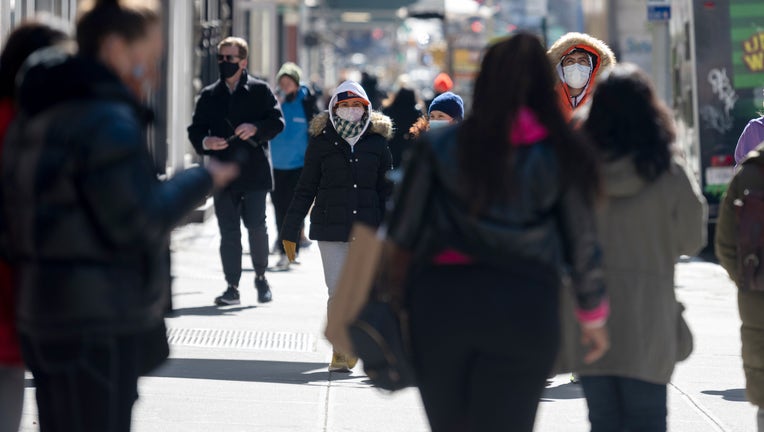Slow walkers more likely to die from COVID-19 regardless of weight, study finds

NEW YORK, NEW YORK - MARCH 19: People wearing masks are seen through a crowd of people walking on March 19, 2021 in New York City. After undergoing various shutdown orders for the past 12 months the city is currently in phase 4 of its reopening plan,
A new study found slow walkers have a much higher risk of contracting severe COVID-19 and of dying from the virus, regardless of weight.
Health researchers in the UK looked at the body mass index and self-reported walking pace of more than 412,000 middle-aged people alongside their projected risk of contracting severe COVID-19.
Researchers from the National Institute for Health Research (NIHR) Leicester Biomedical Research Centre (BRC) found that slow walkers are almost four times more likely to die from COVID-19 and have over twice the risk of contracting a severe version of the virus.
Researchers looked at walking pace because they say it's an easy way to assess someone’s overall physical health.
"Walking pace is a central indicator of whole-body physical fitness, frailty, reserve and resilience, with self-reported walking pace consistently found to be strongly associated with cardiorespiratory fitness, cardiovascular mortality and all-cause mortality, along with being a powerful marker of longevity," study authors wrote.
The study split the participants into three walking groups: slow (<3 mph), steady/average (3-4mph), or brisk (>4 mph).
Researchers also noted the person’s BMI, which is a measure of body fat based on height and weight, and found that slow walkers had the highest risk of COVID-19 severity - regardless of BMI.
RELATED: Risk for COVID-19 hospitalization, death increases depending on body mass index, CDC says
"We know already that obesity and frailty are key risk factors for COVID-19 outcomes. This is the first study to show that slow walkers have a much higher risk of contracting severe COVID-19 outcomes, irrespective of their weight," said Professor Tom Yates, Lead Researcher for the study and a Professor of Physical Activity, Sedentary Behaviour and Health at the University of Leicester.
Researchers say slow walkers with a "normal weight" BMI (18.5 - 24.9) have over twice the risk of severe COVID-19 disease and almost four times the risk of dying from COVID-19 compared to those with a "normal weight" BMI who walk briskly.
Yates suggested public health researchers and officials could begin looking at walking pace or other physical functions in addition to someone’s BMI and other underlying conditions when assessing potential risk for COVID-19 outcomes.
"With the pandemic continuing to put unprecedented strain on health care services and communities, identifying individuals at greatest risk and taking preventative measures to protect them is crucial," he said.
He said if health officials are able to better predict who is at the greatest risk of severe infection or death from COVID-19, they’ll be able to enable better prevention methods that can save lives.
As of March 21, 2021, more than 2.7 million people have died globally from COVID-19, according to data from Johns Hopkins University. Nearly 542,000 of those deaths have been in the U.S.

